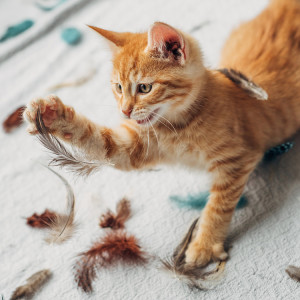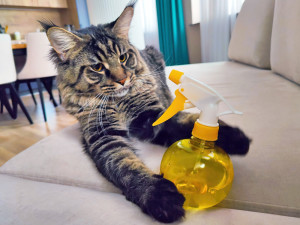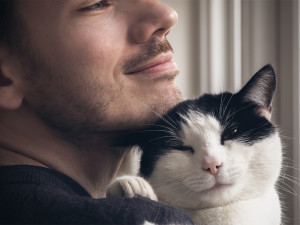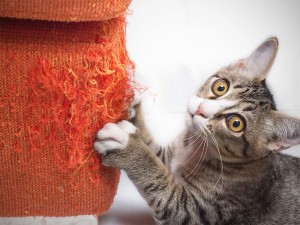Can Cats Have ADHD?
A question you may be asking after you observe any number of their behaviors...
In This Article:
Feline Behavior and Temperament ADHD-Like Symptoms in Cats Possible Causes of ADHD-Like Behavior in Cats How to Treat a Cat With ADHD-Like Symptoms
Have you ever wondered if your cat’s hyperactivity, impulsiveness, or short attention span could be a sign of ADHD? While ADHD is a well-known condition in humans, the question of whether cats can experience similar symptoms is worth asking.
Feline behavior and temperament
Cats differ in personality as much as they do in color. Some cats are perfectly content to lie in the sun and can’t be bothered with expending more energy than what’s required to get to the food bowl, while other cats are full of spunk and will American Ninja Warrior their way around their surroundings.
Some cats are snuggly and can’t seem to get enough human interaction, while others are aloof and just want their humans to give them food and get out of their way. Feline behavior and temperament can be impacted by multiple factors, including:
How much do you spend on your pet per year?
Early socialization
Age at weaning
Genetics
Environment
Hormone levels
Reproductive status
Overall health
ADHD-like symptoms in Cats
Attention-deficit/hyperactivity disorder (ADHD) is a neurodevelopmental disorder commonly diagnosed in children — but can also be diagnosed later in life. It is characterized by symptoms like:
Inattention: An inability to focus
Hyperactivity: Constant and excessive movement
Impulsivity: A likelihood to act without thinking
Reading these symptoms, you might wonder how to know if a cat has ADHD and want to know if your cat has ADHD. The short answer is that while cats may display ADHD-like behaviors, there is no evidence that they can actually be diagnosed with ADHD.
Here are some behaviors that may be misinterpreted as ADHD:
Hyperactivity
Restlessness
Vocalization
Excessive grooming or lack of grooming
Destructive behavior
Poor response to training
Possible causes of ADHD-like behavior in cats
While it can be tempting to apply a human label to a cat’s odd behavior, it’s important to remember that ADHD is a human diagnosis. This doesn't mean unusual feline behaviors should be ignored, especially if they are new.
If your cat seems overly energetic or impulsive, it could be a sign of an underlying medical or behavioral issue. Possible causes of ADHD-like behaviors in cats include:
Hyperthyroid disease
Thyroid hormones play an important role in determining energy levels, metabolism rates, and body temperature. Hyperthyroid disease in cats is caused by the overproduction of hormones by thyroid glands and is commonly diagnosed in senior cats (eight years and older). Symptoms of hyperthyroidism in cats include vomiting, weight loss, poor coat quality, and hyperactivity. Fortunately, there are many treatment options for this condition.
Anxiety and stress
Some cats simply do not handle stress well. Stressed-out kitties can be restless, vocal, and start to over groom themselves. Changes in environment or routine can cause anxiety and behavior changes in cats. Common triggers include moving to a new home, changes in routine, loud noises, and new people or pets.
Boredom
Even lazy cats need mental stimulation. Without it, they may resort to climbing on off-limits areas or scratching furniture. Your cat may develop bad behavioral habits out of lack of something better to do.
Skin disease
Cats with skin disease may experience discomfort or itching that affects their behavior. This is especially true for cats with flea allergy dermatitis (FAD). Cats with FAD are allergic to flea saliva, so flea bites result in itchiness and inflammation, which leads to constant scratching and grooming. They can also have sudden episodes of frantic activity due to intense itchiness.
Cognitive dysfunction
Brain function and cognitive ability can decline with age. This is true for people and pets. Cats can develop cognitive dysfunction syndrome as they age, leading to behavior changes that include circling, pacing, staring, and repetitive actions. They may also show abnormal responses to sounds, lights, or objects.
Hyperesthesia syndrome
Hyperesthesia means an intense sensitivity to touch. Cats with feline hyperesthesia syndrome can display abnormal behaviors in response to petting and tactile stimulation. Common signs include tail chasing, vocalization, episodes of running and jumping, and overzealous grooming (to the point of falling over). The cause of feline hyperesthesia syndrome is unknown, and treatments have had varied success.
Toxicity
If your normally chill cat is suddenly bouncing off the walls, a toxin could be the cause. Several toxins can cause an acute onset of hyperactivity, restlessness, or other ADHD-like symptoms in cats.
Common culprits include:
Chocolate: Methylxanthines in chocolate can cause vomiting, high heart rate, and hyperactivity.
Pyrethrins: Some over-the-counter flea products contain pyrethrins that can cause drooling, hyperactivity, agitation, muscle tremors, and seizures.
Cold and allergy medication: Medications like Sudafed that contain pseudoephedrine can cause hyperactivity, agitation, vomiting, and tremors when ingested by a cat.
Amphetamines: Both prescription and illicit amphetamines can stimulate a cat’s nervous system causing agitation, circling, and restlessness. Ironically, human ADHD medications, like Vyvanse, are in this category.
How to treat a cat with ADHD-like symptoms
A burst of zoomies or a wild response to catnip can be entertaining, but if cats become disruptive or behavior starts to mimic ADHD, cat parents may want to intervene.
Channel their energy: Provide plenty of exercise and engaging toys to help burn off excess energy.
Establish a routine: Predictability can help ease stress and anxiety.
Reward good behavior: Use positive reinforcement training with treats and praise to encourage good behavior.
Talk to your vet: Because cats can’t be diagnosed with ADHD, your vet can help determine the root cause of the behavior. Testing can be performed to rule out underlying medical issues. Your vet can refer you to a veterinary behaviorist if needed.
FAQs (People also ask):
Can cats get ADHD?
While cats may display ADHD-like behaviors, there is no evidence to support a diagnosis of ADHD in cats. Cats may display abnormal behavior due to medical conditions like hyperthyroid disease or behavioral issues, like stress.
What are ADHD symptoms in cats?
Cats aren’t diagnosed with ADHD; that’s a human condition. But cats may display ADHD-like behaviors, including restlessness, hyperactivity, over-grooming, and constant vocalization.
Can cats have ADHD or autism?
There is no evidence to support a diagnosis of attention-deficit/hyperactivity disorder (ADHD) or autism spectrum disorder (ASD) in cats. Consult with your vet if your cat is displaying unusual behavior, especially if it develops suddenly.
References:
Attention-Deficit/Hyperactivity Disorderopens in new tab
Cognitive Dysfunction Syndrome: A Disease of Canine and Feline Brain Agingopens in new tab












